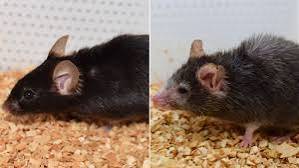Longevity Breakthrough: Scientists Reverse Aging in Mice—Are Humans Next?
A few weeks ago, I caught myself staring at the mirror way too long—counting the fine lines around my eyes and wondering when exactly my face stopped bouncing back like it used to. (Spoiler: It was probably around the same time I started needing coffee before my coffee.) That same day, I randomly stumbled on a headline while doom-scrolling Twitter: “Scientists Reverse Aging in Mice.”
I stopped mid-scroll. Reversed. Aging. In. Mice.
Now, I don’t know about you, but anytime I hear the phrase “reversed aging,” my brain instantly flashes to sci-fi movies or those too-good-to-be-true skin serums influencers push online. But this? This was actual research. Real scientists. White coat stuff.
So naturally, I went down the rabbit hole.
-The Science-y Bit (Don’t Worry, I’ll Keep It Chill)
Turns out, researchers at places like Harvard and MIT have been experimenting with cellular reprogramming—which sounds like something straight out of The Matrix, but it’s real. They’re using special proteins called Yamanaka factors to literally reset cells to a younger state. Basically, it’s like telling your body’s cells, “Hey, remember how spry and youthful you used to be? Let’s go back there.”
And in mice? It worked. They didn’t just look younger—they were younger. Their organs functioned better, their tissues repaired faster, and in some cases, they lived longer.
I know, wild.
-Is the Fountain of Youth… Actually a Lab?
This raises the question we’re all thinking: When do we get in on this? I mean, if mice can sip from the anti-aging Kool-Aid, I’d love a glass too. (Or a pitcher. Just sayin’.)
Apparently, human trials are coming. Some biotech companies—like Altos Labs (which reportedly has funding from the likes of Jeff Bezos because of course)—are pushing this frontier hard. They’re aiming to use this tech not just to extend life, but to improve health during those extra years. So you’re not just older—you’re better.
Sounds awesome, right?
But here’s where I pause.
-Real Talk: Would We Even Be Ready?
I mean… think about it. If aging could be reversed or slowed down, what does that mean for everything else? Retirement. Population. Health insurance. Will 80-year-olds be running marathons or starting TikTok channels? (Actually, that last one is already happening.)
Plus, there’s the bigger existential question: If you could live to 150, would you really want to?
I asked myself that while making toast the other day. Like, sure—I'd love more time with family, more sunrises, more weird little moments. But part of what makes life meaningful is knowing it’s limited, right? (Or maybe I’ve just watched too many deep-cut Pixar films.)
-So… Should We Be Excited or Worried?
Honestly? A bit of both.
On one hand, this is huge. Real, scientific progress that could change how we treat diseases, heal injuries, and maybe—even just maybe—live longer, healthier lives.
On the other hand, it’s kind of terrifying. Like, what do we even do if aging becomes optional?
All I know is this: the next few years are going to be wild. And whether I end up taking an “age reversal therapy” someday or just sticking with my overpriced night cream and turmeric tea, I’m fascinated to see where this goes.
So here’s my question for you:
If you could rewind your biological clock by 20 years, would you? And what would you do differently—with all that extra time?
(And be honest… would you really give up naps?) 😄⏳



